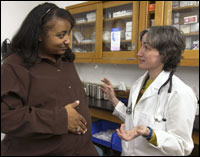Protect Your Baby from Group B Strep
 Protect your baby from group B strep. If you're 35-37 weeks pregnant, ask your doctor or nurse about a group B strep test.
Protect your baby from group B strep. If you're 35-37 weeks pregnant, ask your doctor or nurse about a group B strep test.
If you are pregnant—or know anyone who is—you need to know about “group B strep”. Group B streptococcal bacteria (also called GBS, group B strep, or baby strep) is very common to all types of women and can be passed on to a baby during childbirth. Your baby can get very sick and even die if you are not tested and treated.
Group B strep (sometimes called GBS) is a type of bacteria that is often found in the vagina and rectum of healthy women. In the United States, about 1 in 4 women carry this type of bacteria. Women of any race or ethnicity can carry these bacteria.
Being a carrier for these bacteria does not mean you have an infection. It only means that you have group B strep bacteria in your body, usually living in the rectum or vagina. You would not feel the bacteria or have symptoms like a yeast infection. These bacteria are usually not harmful to you -- only to your baby during labor. Other people in the house, including kids, are not at risk of getting sick from GBS.
Preventing Group B Strep

The medicine to stop GBS from spreading to your baby is an antibiotic given during labor. The antibiotic (usually penicillin) is given to you through an IV (in the vein) during childbirth. If you are allergic to penicillin, there are still other choices to help treat you during labor.
Ask your doctor or nurse for a GBS test when you are 35 to 37 weeks pregnant (in your 9th month). The test is an easy swab of the vagina and rectum that should not hurt.
Each time you are pregnant, you need to be tested for GBS. It doesn't matter if you did or did not have this type of bacteria before -- each pregnancy is different.
Finding the GBS bacteria does not mean that you are not clean, and it does not mean that you have a sexually transmitted disease. The bacteria are not spread from food, sex, water, or anything that you might have come into contact with. They can come and go naturally in the body.
It does not work to take antibiotics for GBS before labor. The bacteria can grow back so fast that taking the medicine before you begin labor does not prevent the bacteria from spreading to your baby during childbirth.
If you think you might have a C-section or go into labor early (premature), talk with your doctor or nurse about your personal GBS plan.
What You Can Do Before Labor
- Ask your doctor or nurse for a GBS test when you are 35 to 37 weeks pregnant (9th month).
- If you are allergic to penicillin or other antibiotics, make sure to tell your doctor or nurse about any reactions you have had.
- If your test shows that you carry the bacteria, talk with your doctor or nurse about a plan for labor.
- Continue your regular check-ups, and always call your doctor or nurse if you have any problems.

When Your Water Breaks or When You Go into Labor
If you have not had your GBS test when labor starts, remind the staff that you do not know your GBS status.
If you are a GBS carrier:
- Go to the hospital. The antibiotics work best if you get them at least 4 hours before you deliver.
- Tell the labor and delivery staff at the hospital that you are a group B strep carrier.
- Speak up if you are allergic to penicillin.
- Expect to get IV antibiotics (medicine through the vein) during labor.
- It is fine to breastfeed after your baby is born.
For More Information
- Get a free brochure on GBS
- Call 1-800-CDC-INFO
- Send an email request to CDC INFO
- Print from a PDF available online
- Send a Health-e-Card
- Prevent Infection and Keep Your Unborn Baby Safe
- ABCs of Healthy Pregnancy
- Preventing Group B Strep
Information for patients, hospital and healthcare providers, laboratory personnel, and state and local health departments


